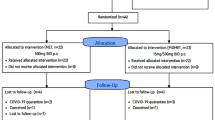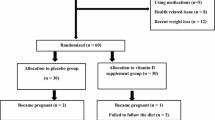Abstract
Purpose
The objective of this study was to assess the efficacy and safety of metformin at the dosage of 2,500 mg/day in the treatment of obese women with PCOS and also to evaluate its effect on weight, hormones, and lipid profile.
Method
This study was a 4-month open-label clinical trial. Sixty-nine PCOS patients aged 20–35 were recruited in the study. Testosterone, free testosterone, sex hormone-binding globulin (SHBG), fasting insulin, dehydroepiandrostenedione-sulphate (DHEAS), FBS, LDH, HDL, TG, total cholesterol, body mass index (BMI), and waist-to-hip ratio were measured before treatment and after 4 months of treatment.
Results
Significant reductions in serum insulin, BMI, waist/hip ratio, and LDL were observed. In addition, a significant increase in SHBG was obtained. Over the 4 months of the trial, 12 patients faced nausea, six patients had bloating, five patients had diarrhea and two had headache; none of these symptoms were severe except for two cases that dropped out due to severe vomiting.
Conclusion
The results of this study show that 2,500 mg daily dose of metformin in obese patients with PCOS is effective in the reduction of BMI, waist hip/ratio, LDL, serum insulin and increases SHBG. In general this dose was relatively safe and well tolerated.
Similar content being viewed by others
References
Neveu N, Granger L, St-Michel P, Lavoie HB (2007) Comparison of clomiphene citrate, metformin, or the combination of both for first-line ovulation induction and achievement of pregnancy in 154 women with polycystic ovary syndrome. Fertil Steril 87:113–120
Trolle B, Flyvbjerg A, Kesmodel U, Lauszus FF (2007) Efficacy of metformin in obese and non-obese women with polycystic ovary syndrome: a randomized, double-blinded, placebo-controlled cross-over trial. Hum Reprod 22:2967–2973
Onalan G, Goktolga U, Ceyhan T, Bagis T, Onalan R, Pabuçcu R (2005) Predictive value of glucose-insulin ratio in PCOS and profile of women who will benefit from metformin therapy: obese, lean, hyper or normoinsulinemic? Eur J Obstet Gynecol Reprod Biol 123:204–211
Teede HJ, Hutchison SK, Zoungas S (2007) The management of insulin resistance in polycystic ovary syndrome. Trends Endocrinol Metab 18:273–279
Greenfield JR, Campbell LV (2004) Insulin resistance and obesity. Clin Dermatol 22:289–295
Mathur R, Alexander CJ, Yano J, Trivax B, Azziz R (2008) Use of metformin in polycystic ovary syndrome. Am J Obstet Gynecol 199:596–609
Maciel GA, Soares Júnior JM, Alves da Motta EL, Abi Haidar M, de Lima GR, Baracat EC (2004) Nonobese women with polycystic ovary syndrome respond better than obese women treatment with metformin. Fertil Steril 81:355–360
De Leo V, Musacchio MC, Morgante G, Piomboni P, Petraglia F (2006) Metformin treatment is effective in obese teenage girls with PCOS. Hum Reprod 21:2252–2256
Jonard S, Dewailly D (2004) The follicular excess in polycystic ovaries, due to intra-ovarian hyperandrogenism, may be the main culprit for the follicular arrest. Hum Reprod Update 10:107–117
Harborne LR, Sattar N, Norman JE (2005) Metformin and weight loss in obese women with polycystic ovary syndrome: comparison of doses. J Clin Endocrinol Metab 90:4593–4598
Bruno RV, de Avila MA, Neves FB, Nardi AE, Crespo CM, Sobrinho AT (2007) Comparison of two doses of metformin (2.5 and 1.5 g/day) for the treatment of polycystic ovary syndrome and their effect on body mass index and waist circumference. Fertil Steril 88:510–512
Rotterdam ESHRE/ASRM-Sponsored PCOS Consensus Workshop Group, Revised 2003. (2004) Consensus on diagnostic criteria and long-term health risks related to polycystic ovary syndrome. Fertil Steril 81:19–25
Ferrimam D, Gallwey ID (1961) Clinical assessment of body hair growth in women. J Clin Endocrinol Metab 21:1440–1447
Lord JM, Flight IH, Norman RJ (2003) Insulin-sensitising drugs (metformin, troglitazone, rosiglitazone, pioglitazone, D-chiro-inositol for polycystic ovary syndrome. Cochrane Database Syst Rev 3:CD003053
Ciccone MM, Favale S, Bhuva A, Scicchitano P, Caragnano V, Lavopa C, De Pergola G, Loverro G (2009) Anteroposterior diameter of the infrarenal abdominal aorta is higher in women with polycystic ovary syndrome. Vasc Health Risk Manag 5:561–566
Balen AH (2007) PCOS, obesity, and reproductive function: RCOG special study group on obesity. RCOG Press, London
Lorenz LB, Wild RA (2007) Polycystic ovarian syndrome: an evidence-based approach to evaluation and management of diabetes and cardiovascular risks for today’s clinician. Clin Obstet Gynecol 50:226–243
Haydardedeoglu B, Simsek E, Kilicdag EB, Bagis T (2009) Metabolic and endocrine effects of metformin and metformin plus cyclic medroxyprogesterone acetate in women with polycystic ovary syndrome. Int J Gynaecol Obstet 105:32–35
Teede HJ, Meyer C, Hutchison SK, Zoungas S, McGrath BP, Moran LJ (2010) Endothelial function and insulin resistance in polycystic ovary syndrome: the effects of medical therapy. Fertil Steril 93:184–191
Elkind-Hirsch K, Marrioneaux O, Bhushan M, Vernor D, Bhushan R (2008) Comparison of single and combined treatment with exenatide and metformin on menstrual cyclicity in overweight women with polycystic ovary syndrome. J Clin Endocrinol Metab 93:2670–2678
Acknowledgments
This study was supported by a grant (Grant No. 5740) from Tehran University of Medical Sciences.
Conflict of interest statement
None.
Author information
Authors and Affiliations
Corresponding author
Rights and permissions
About this article
Cite this article
Aghahosseini, M., Aleyaseen, A., Safdarian, L. et al. Metformin 2,500 mg/day in the treatment of obese women with polycystic ovary syndrome and its effect on weight, hormones, and lipid profile. Arch Gynecol Obstet 282, 691–694 (2010). https://doi.org/10.1007/s00404-010-1579-x
Received:
Accepted:
Published:
Issue Date:
DOI: https://doi.org/10.1007/s00404-010-1579-x




